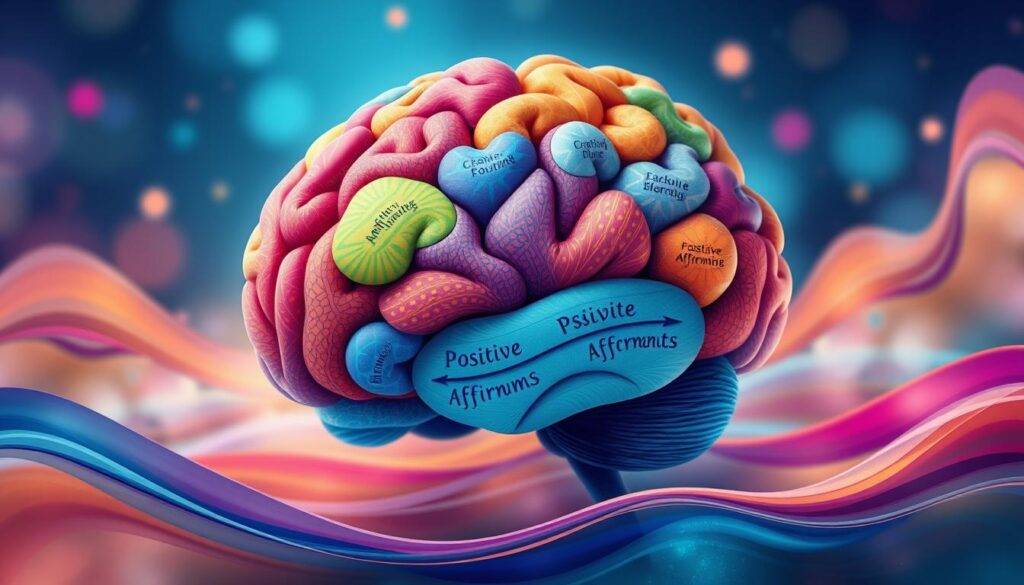“Whether you think you can, or you think you can’t – you’re right.” – Henry Ford
Henry Ford’s words show the power of positive thoughts. Affirmations are statements that help us believe in ourselves. They are based on neurolinguistic programming and positive psychology.
Millions of people use affirmations every day. They help change negative thoughts into positive ones. This can affect our brains and bodies.
Studies show that affirmations can improve our health and relationships. They are linked to better learning and mental health. This is thanks to affective neuroscience, which studies how emotions shape our world.
Key Takeaways
- Positive affirmations are empowering statements that can enhance self-belief and motivation.
- The practice has strong scientific foundations in neurolinguistic programming, positive psychology, and affective neuroscience.
- Affirmations work by rewiring negative thought patterns and impacting both the brain and the body.
- Research has linked affirmations to tangible improvements in areas like health, learning, and relationships.
- Incorporating affirmations into your daily routine can lead to significant personal growth and well-being.
Understanding the Foundation of Positive Affirmations
Self-affirmations are powerful, positive statements that show your true worth. They started with French psychologist Émile Coué’s “optimistic autosuggestions” in the late 1800s. Later, authors like Louise Hay made them popular in the 1980s.
Definition and Core Concepts
Positive affirmations are simple statements that fight negative thoughts. They highlight your strengths and good qualities. These statements make your brain happy, boosting your self-worth and drive.
Historical Development of Affirmation Practice
Émile Coué, a French psychologist, laid the groundwork for positive affirmations. He believed in the power of positive phrases to change people’s minds and actions.
Role in Personal Development
Positive affirmations are key in personal growth. They support self-affirmation theory, which says we all want to see ourselves positively. By affirming your values and strengths, you can grow your confidence and adapt better in life.
“The greatest discovery of my generation is that a human being can alter his life by altering his attitudes.” – William James
Using positive self-statements and optimistic autosuggestions daily can change your life. It helps you become more resilient, overcome doubts, and embrace growth.
The Science Behind Positive Affirmations
Positive affirmations work because of how our brains are wired. By repeating them, we create new paths in our brain. This makes it simpler to think positively. Studies show that saying positive things to ourselves can light up parts of our brain linked to happiness.
Studies say that positive self-talk can make us more resilient and flexible. Doing this regularly can strengthen our brain’s positive connections. It helps us see the world in a brighter light. People who use positive affirmations often see big improvements in their lives.
When we say positive things to ourselves, we build a supportive inner voice. Starting the day with positive affirmations can prepare us for challenges. It helps us stay optimistic. Adding positive affirmations to our daily routine is a great way to think positively.
Positive affirmations can fight off negative thoughts and help us grow. Saying positive things about ourselves boosts our self-esteem. Writing and saying our affirmations out loud makes them stick in our minds.
The saying “Neurons that fire together wire together” is key in neuroscience. Thinking negative thoughts can create paths in our brain that hold us back. But thinking positively can empower us and help us reach our full potential.
Affirmations and visualization can change our brain’s pathways. Daily visualization helps us focus on our goals and see chances. Keeping our goals in mind is key to achieving them. The Selfpause app has guided affirmations to help find joy and success.
“The more you repeat a thought, the more you reinforce the neural pathways in your brain, making it easier for that thought to arise in the future.”
Neuroscience and Neural Pathways
Positive affirmations change your brain’s neural connections. The brain’s ability to adapt and create new pathways is key. Studies show that affirmations activate areas linked to happiness and reward.
Brain Plasticity and Affirmations
Engaging in positive self-talk rewires your brain. It makes you more optimistic and resilient. This change can last a long time.
Neural Network Formation
Repeating affirmations trains your brain to focus on the positive. This strengthens neural connections. Over time, you’ll find it easier to stay positive in tough situations.
Cognitive Restructuring Process
Affirmations are crucial in cognitive behavioral therapy. They help replace negative thoughts with positive ones. This change is seen in your brain’s physical structure.
| Study | Findings |
|---|---|
| David Creswell (2013) | A brief self-affirmation activity at the beginning of the school term can boost academic grade-point averages for underperforming kids by the end of the semester. |
| Sherman et al. (2011) | Affirmations help remind people of important aspects of the self, enabling them to view events from a more rational viewpoint. |
| Falk et al. (2015) | MRI scans of the brain show certain neural reward pathways becoming more active when personal values are considered. |
Self-Affirmation Theory and Psychological Benefits
Self-integrity is key for humans. It means feeling worthy and morally sound. Claude Steele’s self-affirmation theory says we all want to keep our self-image positive. When our self-image is threatened, we use self-affirmation to protect our sense of self.
Studies show self-affirmations are good for us. They help us reflect on our important traits and values. This boosts our resilience, lowers stress, and makes us more positive.
Self-affirmations are linked to better mental health. They help us deal with stress, anxiety, and depression. They also help us stay in control and feel empowered, even when things get tough.
“Positive affirmations activate brain reward circuitry and affect dopamine receptors in the ventral striatum, leading to enhanced emotional well-being and a sense of psychological resilience.”
Adding self-affirmation to your daily routine can boost your self-integrity, core values, and psychological wellbeing. You can do this through journaling, visualization, or saying positive things to yourself. Regular self-affirmation helps you handle life’s challenges better.

The Brain’s Response to Self-Affirmation
Many studies have shown that self-affirmation changes the brain. When you say positive things to yourself, it makes your brain’s reward system work better. This means you might see good things happening in your life more often.
Also, self-affirmation can make your brain less stressed. It helps you handle tough times better. The part of your brain that deals with emotions might not get as upset by bad things.
Amygdala Activity and Emotional Regulation
The amygdala is a small part of the brain that deals with emotions like fear. Studies say self-affirmation can calm it down. This helps you feel less stressed and manage your emotions better.
Reward System Activation
Self-affirmation also turns on the brain’s reward system. This is like when you enjoy something good, like food or reaching a goal. It makes your brain think positive thoughts.
Stress Response Modification
Self-affirmation can also change how your brain handles stress. People who do this often have less stress in their brains. This can make you feel better and handle anxiety better.
“Affirmations activate the brain’s reward centers, similar to pleasurable experiences like eating favorite foods or winning prizes.”
Role of Neuroplasticity in Affirmation Practice
Starting your journey with positive affirmations opens up a world of change. Neuroplasticity, the brain’s ability to adapt, is key. It shows why affirmations can change lives.
Positive self-talk and affirmations create new brain paths. This strengthens your positive views and weakens negative ones. Your brain becomes more flexible and adaptable.
Studies link optimism to a longer life. Positive thinking can make you healthier and boost your immune system. Affirmations tap into this power, improving your mental health and unlocking your potential.
Self-affirmation lowers stress and boosts well-being. It also helps in work and personal relationships. People who affirm themselves show more brain activity in self-worth areas.
“Harnessing positive thinking through self-affirmations requires repetition and persistence.”
To benefit from neuroplasticity, make affirmations real and meaningful. Reading them out loud daily helps instill positive beliefs. You’ll see changes in your brain and mind.
| Neuroplasticity Benefit | Impact on Affirmation Practice |
|---|---|
| Brain Adaptability | Enables the reinforcement of positive self-perceptions and weakening of negative thought patterns |
| Neural Pathway Formation | Strengthens the neural connections associated with positive beliefs and behaviors |
| Cognitive Flexibility | Allows for the adoption of new, empowering thought patterns and mental adaptability |

Impact on Mental Health and Well-being
Positive affirmations greatly benefit mental health and well-being. They tap into the mind’s power. This can lower stress, boost self-esteem, and handle anxiety. It leads to psychological resilience, emotional wellbeing, and mental health improvement.
Stress Reduction Mechanisms
Positive affirmations help lower cortisol, the main stress hormone. They shift focus to positive beliefs. This helps manage everyday challenges better.
Self-esteem Enhancement
Self-affirmation boosts self-esteem and confidence. Studies show affirmations based on core values work best. They keep self-view positive and restore self-competence.
Anxiety Management
Positive affirmations are a strong tool for anxiety. They change negative thoughts to positive ones. This reduces anxiety symptoms and boosts emotional well-being.
Many studies show affirmations’ big impact on mental health. They reduce stress, boost self-esteem, and manage anxiety. Regular affirmation practice improves mental health and emotional wellbeing.
“Affirmations are like seeds. If you plant them, they will grow into something amazing.”
Scientific Evidence and Research Studies
Many studies have looked into the power of positive affirmations. They’ve used empirical research, clinical trials, and psychological studies. These studies show how affirmations can help us grow and feel better.
David Creswell from Carnegie Mellon University found that affirmations can shield us from stress. They also help students do better in school. Starting the school year with affirmations can really make a difference.
When people did affirmations before a tough task, they did better. They were as good as those who didn’t have much stress. But, those with a lot of stress found it harder to solve problems.
Affirmations also help in other ways. They can make us feel more confident and less stressed. They even help our bodies by lowering stress hormones.
| Findings | Implications |
|---|---|
| Self-affirmation can protect against the damaging effects of stress on problem-solving performance. | Affirmations may enhance cognitive abilities and academic performance, especially for those under high stress. |
| Self-affirmation activities can boost academic grade-point averages in underperforming students. | Affirmations may be a valuable tool for improving educational outcomes and closing achievement gaps. |
| Positive affirmations are linked to increased self-confidence, reduced stress, and lower cortisol levels. | Affirmations may promote physical and mental well-being by regulating the body’s stress response. |
The science behind positive affirmations is clear. They are a powerful tool for personal growth and well-being. By using affirmations, we can improve our lives in many ways.
Biological Markers and Physical Health Benefits
Positive affirmations do more than just help your mind. They also improve your physical health. They can lower stress hormones like cortisol, which is good for your health. This can make your immune system stronger, leading to better health overall.
Positive affirmations can also make you perform better physically. This is because they boost your confidence and lower stress. When your mind is strong, your body can be too, leading to better physical abilities.
Cortisol Level Changes
Many studies show that positive affirmations can lower cortisol levels. Cortisol is a hormone linked to stress. Lowering it can help your body feel better and improve your health.
Immune System Response
Lower stress hormones from positive affirmations help your immune system. Research shows that this can make your body fight off sicknesses better. This leads to better health and well-being.
Physical Performance Improvements
Positive affirmations also help with physical performance. They boost your confidence and lower stress. This can unlock your body’s full potential, leading to better athletic abilities.
“Positive emotions and positive evaluations of life are associated with decreased risk of disease, illness, and injury; healthier behaviors; better immune functioning; speedier recovery; and increased longevity.”
Integration with Cognitive Behavioral Therapy
Positive affirmations can work well with Cognitive Behavioral Therapy (CBT) to make mental health treatments better. Both methods aim to change thought patterns to improve emotions and actions.
In therapy, affirmations can help CBT by boosting positive self-image and fighting off negative thoughts. This mix can help people with depression, anxiety, and low self-esteem feel better.
Cognitive Behavioral Therapy is a proven psychological intervention that tackles mental health issues by changing negative thoughts. Adding positive affirmations to CBT helps people understand their thoughts better and find healthier ways to cope.
The connection between affirmations and CBT comes from their shared goal of changing thoughts. Affirmations can strengthen the positive self-talk learned in CBT, helping people keep up the good work done in therapeutic techniques.
Studies show that combining affirmations and CBT can boost focus, self-belief, and problem-solving skills. These skills are key to better mental health and well-being. By using positive thinking and CBT’s structured approach, people can build a stronger and more flexible mindset. This leads to lasting mental health treatment results.

“Affirmations are a powerful tool that can be seamlessly integrated with Cognitive Behavioral Therapy to create a more holistic and effective approach to mental health treatment.”
Creating Effective Affirmation Practices
Making personalized affirmations is crucial. They should be realistic and match your values and goals. Instead of saying “I love myself,” aim for specific, doable affirmations. For example, “Every day, in every way, I am feeling better about myself.”
Adding affirmations to your daily life boosts their effect. Start your day with positive words or take breaks to repeat them. Being consistent helps change your thoughts. Mix your affirmations with mindfulness, like deep breathing, to strengthen positive thoughts.
| Affirmation Approach | Key Benefits |
|---|---|
| Specific, behavior-focused affirmations | Stronger alignment with personal values and goals, driving targeted behavioral changes |
| Incorporating affirmations into daily routines | Increased consistency and frequency, leading to more profound neurological rewiring |
| Pairing affirmations with mindfulness practices | Enhanced self-awareness and emotional regulation, amplifying the positive effects |
The strength of personalized affirmations, daily routines, and mindfulness techniques is in changing how you see yourself. By using these methods together, you can build a more positive mindset. This mindset helps you reach your goals.
Future Research and Emerging Trends
Positive affirmations are getting a boost from new research and tech. Scientists are looking into using neurofeedback with affirmations for better results. They also want to mix affirmations with digital health tools like apps and wearables for personal help.
Current Studies in Progress
Researchers are working on combining affirmations with neurofeedback therapy. They hope to make digital health interventions more effective. This could help with many mental health and personal growth issues.
Potential Applications
- Using affirmations in personalized medicine for mental health
- Creating mobile apps and wearables for personal support
- Helping workplaces with employee well-being and performance
- Adding affirmations to school curricula for better mindsets and grades
Integration with Technology
Researchers are finding ways to link positive affirmations with new tech. They’re making apps and wearables that give personalized affirmations and track progress. This tech aims to make affirmations more accessible and effective for personal growth.
“The future of positive affirmations lies in their ability to adapt and thrive within the ever-changing landscape of technology and personalized medicine. As we continue to unravel the complexities of the mind-body connection, the integration of affirmations with cutting-edge tools and research will unlock new possibilities for enhancing our overall well-being.”
Conclusion
Positive affirmations work through many levels of our mind and body. Research shows they can help improve your mental health and personal growth. They are a key part of a complete approach to feeling better about yourself.
Studies have found that affirmations change our brain’s activity. They affect areas linked to how we see ourselves, manage emotions, and feel rewarded. This shows how our brains can adapt to positive thoughts.
Using self-improvement techniques backed by science can make affirmations even more effective. They help build a stronger, more confident you. Adding affirmations to your routine can greatly benefit your mental and physical health.
FAQ
What are positive affirmations?
Positive affirmations are empowering statements. They help boost self-belief and motivation. Studies show they can also improve self-esteem and resilience.
What is the history behind positive affirmations?
French psychologist Émile Coué started positive affirmations in the late 19th century. He called them “optimistic autosuggestions.” Later, authors like Louise Hay made them popular in the 1980s.
How do positive affirmations work?
Affirmations replace negative thoughts with positive ones. This can change how our brain and body work. They come from fields like affective neuroscience, which studies emotions.
What is the role of neuroplasticity in positive affirmations?
Neuroplasticity lets our brain change and make new connections. Studies show affirmations can make brain areas linked to happiness work better.
How does Self-Affirmation Theory explain the benefits of positive affirmations?
Self-Affirmation Theory says we all want to see ourselves positively. Affirmations that match our values can make us feel stronger and make better choices.
How does the brain respond to self-affirmation practices?
Studies show self-affirmation changes the brain’s reward system. It makes areas that link good things to positive outcomes work better. This helps us handle stress better.
What are the psychological benefits of positive affirmations?
Positive affirmations are good for our mental health. They can lower stress, boost self-esteem, and increase confidence. They help manage anxiety by changing negative thoughts to positive ones.
What does the research say about the effectiveness of positive affirmations?
Many studies have looked at positive affirmations. They found that affirmations can make us exercise more, eat healthier, and think better about good behaviors.
How can positive affirmations impact physical health?
Regular affirmation practice can lower cortisol, a stress hormone. This can help our immune system and physical performance.
How can positive affirmations be integrated with Cognitive Behavioral Therapy (CBT)?
Affirmations and CBT both aim to change negative thoughts. Combining them can make mental health treatments more effective.
How can you create effective affirmation practices?
Make affirmations personal and achievable. Use them daily and with mindfulness to get the most benefit.
What are the emerging trends in positive affirmation research?
Research is looking at new ways to use affirmations. This includes combining them with neurofeedback and digital health technologies for better results.




























































